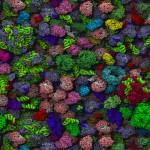Antimicrobial Peptides
A groundbreaking study published in PLOS ONE offers hope that scientists can reverse the development of antibiotic resistance among bacteria with the help of "a mathematical model that pinpoints optimal antibiotic cycling patterns." On The Pump Handle, Kim Krisberg writes, "the research comes at a time of widespread concern that without a coordinated, well-funded response to growing antibiotic resistance, medicine could lose some of its most effective, life-saving tools." The collaboration between biologists and mathematicians yielded a piece of software dubbed "Time Machine" that "computes…
Eleven years ago, two scientists made a bet. One scientist wagered that a new type of antimicrobial agent, called antimicrobial peptides, would not elicit resistance from bacterial populations which were treated with the drugs. Antimicrobial peptides are short proteins (typically 15-50 amino acids in length) that are often positively charged. They are also a part of our body's own innate immune system, and present in other species from bacteria to plants. It is thought that these peptides work primarily by disrupting the integrity of the bacterial cell, often by poking…
